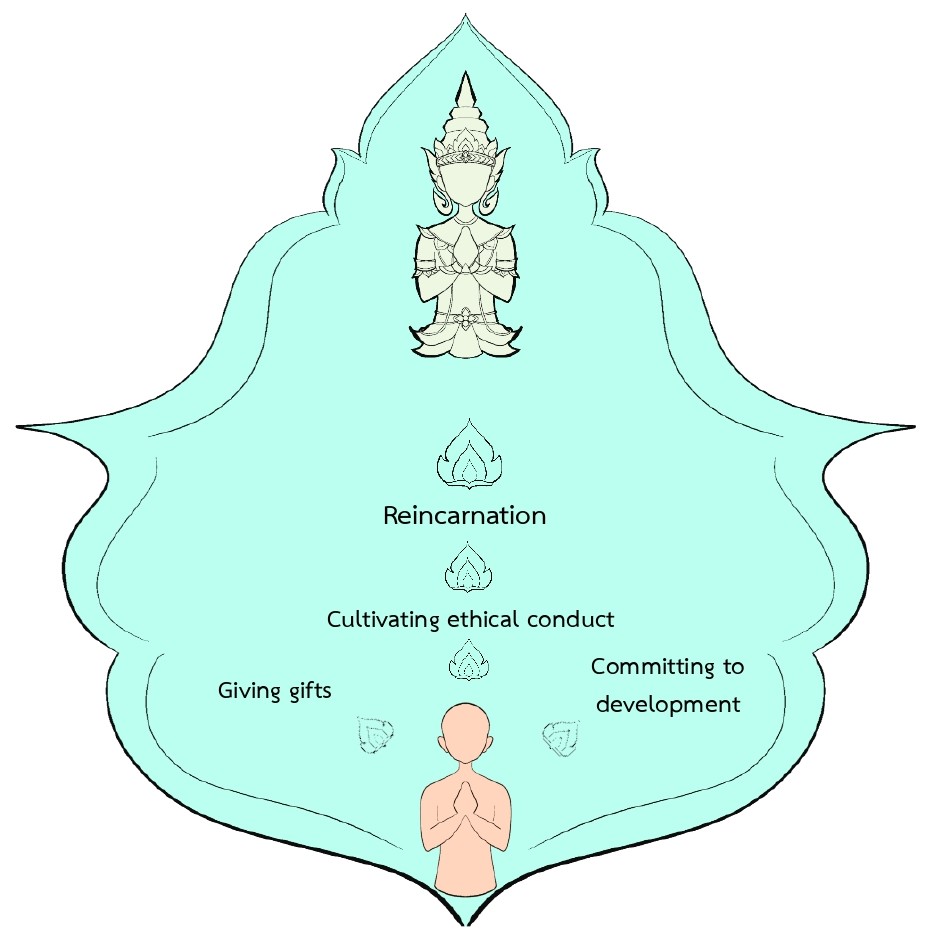AN ANALYTICAL STUDY OF THE AFFECT OF BELIEF IN DEVATÃ ON THE CURRENT THAI SOCIETY
Keywords:
Belief, Devatã (Deities), Current Thai SocietyAbstract
Background and Objectives: Thai society is a society that has diverse beliefs in various dimensions and adopts various cultures into daily life effortlessly and harmoniously with such cultures without gaucherie. It can be said that Thai society is a flexible society. It adapts so well to many cultures. Even though Thai society in the present is ever-changing, it consists of many forms of modern technologies to satisfy the comfort of life or addiction to the convenience of materialism. In another part of the human mind, it still sustains the belief in Devatã (Deities) and sacred entities. The objectives of this research are to study the concept of the belief in Devatã in Thai society, study the story of Devatã that appears in Buddhist scriptures, and analyze the belief in Devatã that affects current Thai society.
Methodology: This research was qualitative research that consisted of studying documentary data by studying primary documents such as Thai Tripitaka and secondary documents such as data from textbooks, books, articles, and research documents related to the subject field. All obtained data was then analyzed and presented in the form of an analytical description together with the researchers' opinions and perspectives in order to summarize, discuss the results, and present recommendations in the research.
Main Results: The result indicated that the concept of belief in Devatã had existed for a long time in Thai society, which was influenced by Buddhist teachings. It was believed that Devatã had sacredness that could give fortune or safety in life. In the Buddhist scriptures, it was found that Devatã meant a group of heavenly deities. It was a collective term for the inhabitants of heaven, both male and female. They were the inhabitants of heaven who ate divine food and had etheric bodies, clairvoyance, and clairaudience. They were born spontaneously. Devatã, or deities that appeared in various scriptures, were considered the beings within Saṃsāra. They were companions in emergence, aging, suffering, and death, much like humans and animals. In terms of the belief in Devatã affecting current Thai society, the research indicated that there was a belief in Devatã as a role model for doing good deeds and a role model of conduct. They were believed to be the sacred entities that constantly protected and assisted humans who had done good deeds and the sacred entities that constantly protected the country.
Involvement to Buddhadhamma: This research involves Applied Buddhism, which is Buddhism and the Development of Wisdom and Morality with Buddhism. Devatã has appeared in Buddhist scriptures as a role model in doing good deeds that include giving gifts, cultivating ethical conduct, and committing to development, which is Buddha's teaching that has made people believe in the existence of Devatã. Moreover, people also believe that Devatã will protect their lives if they live their lives by giving gifts, cultivating ethical conduct, and committing to development. The belief has influenced and remarkably set a guideline for daily life in Thai society.
Conclusions: The belief in Devatã was a belief that was influenced by Buddhist teachings and had existed for a long time in Thai society. Especially in the society of Buddhists, Devatã was regarded as a powerful entity. It had a sacredness that could bring forth things, protect humans from dangers, and safeguard humans' happiness and prosperity. It was the belief that influenced and affected Thai society in many ways, such as the belief that Devatã was a role model for doing good deeds. Every belief that Thai society perceived about Devatã was consistent with Buddhist teachings and resulted in the prosperity and tranquility of Thai society all along.
References
Boonchuay, S., Phrakru Kosolsassanapundit & Promta, S. (2023). The empiricism and belief of gods. MCU Ubon Journal, 8(1), 1026-1038.
Inthachak, S. (2019). Strengthing Socia Ethics Through Animism And Buddhism In Lanna. Mahachula Academic Journal, 6(1), 265-280.
Mahachulalongkornrajavidyalaya University. (1996). Thai Tripitaka. Bangkok: Mahachulalongkornrajavidyalaya University Printing Press.
Phrakru Uthaikitjaruk & Phrakrubaidika Suwin Suvichano. (2019). The Traditional Belief of People to Promoting of Good Thai Civilian. Journal of Graduate MCU KhonKaen Campus, 6(2), 271-286.
Phra Jukkrit Teeradhammo. (2015). An Analytical Study of The concept of Deities in the Cakkavaladipani Scripture. Journal Of Buddhist Studies, 6(1), 82-95.
Phra Saokam Dhammavaro. (2017). A analytical study of the Ethics in Devatã to Thai Society [Master's thesis, Mahachulalongkornrajavidyalaya University]. E-Thesis Central Library Mahachulalongkornrajavidyalaya University. https://e-thesis.mcu.ac.th/thesis/284.
Phra-adhikan Khampa Atibalo. (2014). A Study of Belief and Relation between Man and Deity in Theravāda Buddhist Perspectives [Unpublished master's thesis]. Mahachulalongkornrajavidyalaya University.
Phrakhrubaidika Hassadee Praking. (2020). The Belief of way of Buddhists in Thai society. Journal of MCU Loei Review, 1(2), 54-65.
Phrakru Kanchanakitcharak, Phramaha Somboon Vuḍḍhikaro & Krichackra, O. (2022). An Analytical Study of the Development of Human Being Towards Deva according to Puññakiriyãvatthu. Mahachula Academic Journal, 9(1), 70-82.
Phramaha Somporn Buddhaviro. (2018). A Critical Study of the Moral Utility of the Belief in Gods in Theravada Buddhist Philosophy [Unpublished master's thesis]. Mahachulalongkornrajavidyalaya University.
Tattan, K. (2018). Belief In Deva In Lanna Society [Unpublished master's thesis]. Mahachulalongkornrajavidyalaya University.

Downloads
Published
How to Cite
Issue
Section
License
Copyright (c) 2023 Journal of Buddhist Anthropology

This work is licensed under a Creative Commons Attribution-NonCommercial-NoDerivatives 4.0 International License.








